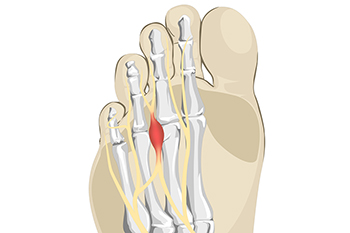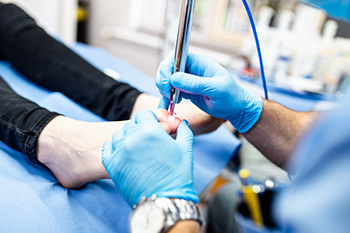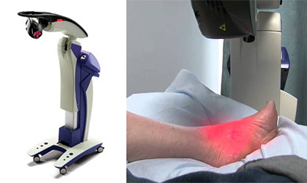Connect With Us
Blog
Items filtered by date: November 2023
Symptoms of Morton’s Neuroma

Morton’s neuroma is a painful and often underestimated condition that affects the ball of the foot, specifically targeting the web space between the third and fourth toes. More prevalent in middle-aged women, this condition can be debilitating, impacting one's daily activities. The discomfort of Morton’s neuroma may start as a subtle ache after walking, standing, or engaging in impact activities, but eventually it becomes more consistent and intense. Morton’s neuroma primarily targets the interdigital nerve, leading to swelling and thickening of the fibrous tissue surrounding the nerve. This compression can result in numbness or a pins and needles sensation in the forefoot. As it progresses, the pain may extend beyond the web space and radiate into the metatarsals. Patients often describe feeling as if there is a pebble or stone in their shoe. This unique sensation is a result of increased swelling and fibrotic thickening around the neuroma, causing an enlargement of the affected area. If you suspect you are experiencing symptoms of Morton's neuroma, it is suggested that you make an appointment with a podiatrist for a thorough evaluation and a personalized treatment plan.
Morton’s neuroma is a very uncomfortable condition to live with. If you think you have Morton’s neuroma, contact David A. Edmonds, DPM of Advanced Podiatry Associates. Our doctor will attend to all of your foot care needs and answer any of your related questions.
Morton’s Neuroma
Morton's neuroma is a painful foot condition that commonly affects the areas between the second and third or third and fourth toe, although other areas of the foot are also susceptible. Morton’s neuroma is caused by an inflamed nerve in the foot that is being squeezed and aggravated by surrounding bones.
What Increases the Chances of Having Morton’s Neuroma?
- Ill-fitting high heels or shoes that add pressure to the toe or foot
- Jogging, running or any sport that involves constant impact to the foot
- Flat feet, bunions, and any other foot deformities
Morton’s neuroma is a very treatable condition. Orthotics and shoe inserts can often be used to alleviate the pain on the forefront of the feet. In more severe cases, corticosteroids can also be prescribed. In order to figure out the best treatment for your neuroma, it’s recommended to seek the care of a podiatrist who can diagnose your condition and provide different treatment options.
If you have any questions, please feel free to contact our offices located in Northampton and Allentown, PA . We offer the newest diagnostic and treatment technologies for all your foot care needs.
Exploring the Facts About Heel Spur Surgery

Heel spurs, bony outgrowths that form on the underside of the heel bone, can cause persistent heel pain and discomfort. While non-surgical treatments are often the first line of defense, heel spur surgery may become a consideration when conservative methods fail to provide relief. Heel spur surgery typically involves removing the spur or releasing the plantar fascia, the tissue that connects the heel bone to the toes. It is important to note that heel spurs themselves may not always be the sole source of pain. Often it is the associated inflammation and damage to the surrounding tissues that cause discomfort. Surgery is typically considered a last resort, reserved for cases where other treatments have proven ineffective. It is vital for individuals to have a thorough evaluation by a healthcare professional to determine the cause of their heel pain and whether surgery is the best course of action. If you have developed a heel spur, it is strongly suggested that you consult a podiatrist who can determine if surgery is a correct treatment option for you.
Foot surgery is sometimes necessary to treat a foot ailment. To learn more, contact David A. Edmonds, DPM of Advanced Podiatry Associates. Our doctor will assist you with all of your foot and ankle needs.
When Is Surgery Necessary?
Foot and ankle surgery is generally reserved for cases in which less invasive, conservative procedures have failed to alleviate the problem. Some of the cases in which surgery may be necessary include:
- Removing foot deformities like bunions and bone spurs
- Severe arthritis that has caused bone issues
- Cosmetic reconstruction
What Types of Surgery Are There?
The type of surgery you receive will depend on the nature of the problem you have. Some of the possible surgeries include:
- Bunionectomy for painful bunions
- Surgical fusion for realignment of bones
- Neuropathy decompression surgery to treat nerve damage
Benefits of Surgery
Although surgery is usually a last resort, it can provide more complete pain relief compared to non-surgical methods and may allow you to finally resume full activity.
Surgical techniques have also become increasingly sophisticated. Techniques like endoscopic surgery allow for smaller incisions and faster recovery times.
If you have any questions please feel free to contact our offices located in Northampton and Allentown, PA . We offer the newest diagnostic and treatment technologies for all your foot and ankle needs.
Who Benefits From Laser Treatment for Fungal Toenails?

Laser therapy uses focused light to destroy toenail fungus, preventing it from spreading or getting worse. This type of treatment has evolved since the 1980s with various lasers now in use, affecting the success rate for different individuals. Laser treatment can be particularly useful for individuals who cannot take certain medications due to liver or kidney problems, in addition to people with diabetes, and older adults who might not tolerate drugs well. Early treatment of toenail fungus is advised by the CDC to stop the spread of the infection and ensure better results. If not treated, the fungus may spread beyond the toenails. If you have toenail fungus, particularly if it does not resolve with more conservative treatment, it is suggested that you make an appointment with a podiatrist to discuss whether laser treatment may be an option worth considering.
Laser treatment can be an effective way to get rid of toenail fungus. If you have any questions about laser treatment, consult with David A. Edmonds, DPM from Advanced Podiatry Associates. Our doctor will assess your condition and provide you with quality treatment for fungal nails.
What Are Toenail Fungal Infections?
Onychomycosis, or fungal infection of the nail, is a relatively common and non-serious condition. Around 10 percent of U.S. citizens are afflicted with fungal nails. Common forms of fungus that infect the nail include dermatophytes, yeasts, and molds.
Symptoms of Toenail Fungal Infections Include:
- Nail thickening
- Brittleness of the nail
- Discoloration of the nail
Diagnosis for Fungal Nails
Fungal infections are diagnosed by fungal culture and microscopy. This will rule out any other conditions such as nail trauma, psoriasis, lichen planus, and onychogryphosis.
What Is Laser Treatment?
Laser treatment is a non-invasive, safe, quick, and painless procedure that uses the heat from a laser to kill fungus in the nail. Each infected nail is targeted with a laser for several minutes. The treatment is usually utilized several different times over a select period. During this time, a podiatrist will keep an eye on the infection.
If you have any questions, please feel free to contact our offices located in Northampton and Allentown, PA . We offer the newest diagnostic and treatment technologies for all your foot care needs.
Benefits of MLS Laser Therapy

Whether you are dealing with chronic discomfort, the aftermath of an injury, or the wear and tear of daily life, Multiwave Locked System, or MLS, laser therapy may be a solution. MLS laser therapy is a non-invasive approach to foot pain. It aids in recovery from a variety of foot ailments, including sports injuries, arthritic pain, and nerve pain from diabetes, as well as heel pain from plantar fasciitis and Achilles tendon injuries. It has also been helpful in dealing with wounds that will not heal. MLS laser therapy does not involve medication, needles, or surgery and is FDA-approved for both safety and effectiveness. Furthermore, MLS laser therapy addresses the challenge of inflammation, a common hindrance to mobility and a source of discomfort in podiatric conditions. It actively reduces inflammation, decreasing pain and increasing comfort. MLS laser therapy not only accelerates the healing process but also allows for treatment plans that cater to specific foot care needs. To determine if MLS laser therapy is right for you, it is suggested that you consult a podiatrist.
MLS Laser Therapy is a successful alternative for treating any pain you may be experiencing related to certain podiatric conditions. If you are interested in MLS Laser Therapy, consult with David A. Edmonds, DPM from Advanced Podiatry Associates. Our doctor will assess your condition and provide you with quality foot and ankle treatment.
MLS Laser Therapy
Multiwave Locked System (MLS) Laser Therapy is a patented, FDA-cleared technology that helps relieve pain and inflammation from a number of podiatric conditions, including:
- Heel Pain
- Plantar Fasciitis
- Sports Injuries
- Wounds
- Achilles Tendonitis
- Arthritis
- Neuropathy
- Neuromas
MLS Laser Therapy is an ideal alternative to surgery and prescription medication, as it has no negative side effects and encourages accelerated healing. Among its many clinical benefits, MLS Laser Therapy also:
- Reduces swelling due to bruising or inflammation
- Blocks pain
- Reduces formation of scar tissue
- Improves nerve function
If you have any questions, please feel free to contact our offices located in Northampton and Allentown, PA . We offer the newest diagnostic and treatment technologies for all your foot care needs.

